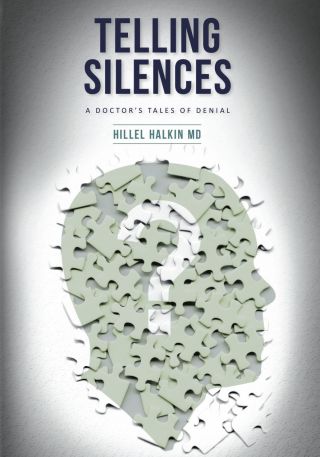Hypnosis
Telling Silences: A Doctor’s Tales of Denial
Stories of patients whose denial of their conditions led to severe consequences
Posted December 3, 2013

Telling Silences: A Doctor’s Tales of Denial by Hillel Halkin M.D. is a book of invitingly written clinical stories of patients in denial. Halkin is Professor Emeritus of medicine and clinical pharmacology at Tel Aviv University School of Medicine.
(Full disclosure: Hillel Halkin MD, the author of Telling Silences, is my first cousin, the son of my mother's sister. He should not be confused with the writer Hillel Halkin—without the M.D.—who is his cousin, the son of his father's brother.)
Each of the book’s nine chapters is a self-contained piece, discursively describing a patient and Halkin’s relationship with him or her along with relevant others—including family members and other professionals. The chapters read more like short stories than case histories—some almost like detective stories—and cover a wide range of conditions, including diseases of the heart, skin, and brain, unacknowledged severe psychological problems, and some exotic ailments. One of the high points of the book is the author’s candor about his feelings about the patients and other people involved; and the last chapter describes his own thought processes and relationship with his wife as he avoided recognizing his own serious medical condition.
***
Here is an example of Halkin’s writing:
I found myself starting to feel uneasy about how things were unfolding. I slept badly at night, always a sure sign that something about a patient was worrying me. A vague thought, a shapeless memory, tugged at the edge of my consciousness but stubbornly eluded me. I became frustrated and, as my wife put it, very crotchety. Then early one morning, after tossing and turning for hours, I sat bolt upright in bed, having suddenly realized what had been bothering me.
The first time Jonathan came to see me, I noticed a patch of light brown discoloration on the skin of his back, which I took for a change in pigmentation caused by overexposure to the sun. Such changes are not uncommon in our Mediterranean climate; I myself have them and find it necessary to cover my face and arms when exposed to the sun. I therefore did not give the matter a second thought. In fact, I did not even recall noticing the patch until that sleepless night, when its memory suddenly resurfaced. It then took on a whole new significance. (P. 111.)
***
Nearly all of Halkin’s descriptions include both physical and psychological (not to mention sociocultural) elements mixed together. In many ways the book represents the other side of the coin of my own experiences, and reminds me of cases of my own. That is, just as a physician has to figure out what role psychological elements play in an apparently medical condition, a therapist has to figure out what role medical elements play in an apparently psychological condition. And sometimes both elements are so intertwined that it is difficult to separate them.
I remember, for example, years ago when physicians were less candid with their patients and the word “cancer” was still taboo, a man who was referred to me for hypnosis and relaxation. The man had had a tumor removed from his throat, and was supposed to use a kind of buzzer device against his neck to enable him to speak. Somehow, he was unable to master the apparatus, and his physician thought that anxiety might be causing him to tense his neck muscles and prevent him from making use of the device.
I saw him for a couple of sessions, and he responded well to the hypnosis and relaxation—but with no effect on his speech. So I sent him back to his physician with the message that trying hypnosis and relaxation was a good idea, but that it hadn’t worked.
I called back a few months later to follow up, and learned that the cause of the man’s difficulty with the device was that there had been a second tumor in his throat that had gone undetected. A second surgery removed that tumor; but the man died not that long thereafter.
**
When Halkin speaks of denial, he is not referring to people who don’t recognize the significance of their symptoms. After all, physicians also make mistaken diagnoses. Instead, the stories describe people whose symptoms are dramatic, who don’t tell loved ones or physicians about them, and who “forget” serious diagnoses—sometimes repeatedly—even though they were correctly made at different times and in different places by different specialists. One of the stories is even about a husband and wife who, in an amazing folie à deux, cooperate in forgetting/distorting/denying the husband’s precarious condition.
Denial is a psychological process that in some ways is the opposite of hypochondria. In hypochondria, a person mistakes benign conditions for serious symptoms; denial involves disregarding serious symptoms or viewing them as benign. In statistical terminology, hypochondria can be likened to a false positive, or a type I error (false rejection of the hypothesis that the condition is benign), while denial is like a false negative or a type II error (false acceptance of the hypothesis that that condition is benign).
In terms of consequences, denial is reinforced by being able to continue everyday activities, by avoiding the pain caused by medical treatments, and by avoiding the social and financial consequences of dealing with a serious illness. Hypochondria is reinforced by the attention of family, friends, and medical personnel. So there are environmental factors that tend to perpetuate both extremes.
Halkin’s stories make the denial of serious medical conditions vivid, and his description of his own medical denial leaves the reader wondering, “Can I see myself or those close to me reflected in any of these stories?”
Image source:
Cover of Telling Silences
Check out my most recent book, The Myth of Race, which debunks common misconceptions, as well as my other books at http://amazon.com/Jefferson-M.-Fish/e/B001H6NFUI
The Myth of Race is available on Amazon http://amzn.to/10ykaRU and Barnes & Noble http://bit.ly/XPbB6E
Friend/Like me on Facebook: http://www.facebook.com/JeffersonFishAuthor
Follow me on Twitter: www.twitter.com/@jeffersonfish
Visit my website: www.jeffersonfish.com




